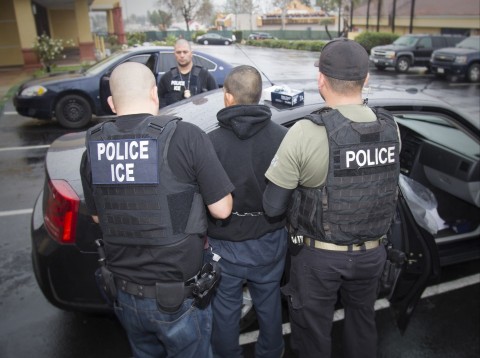
U.S. Immigration and Customs Enforcement arrest immigrants in Los Angeles in February. A group of police chiefs has issued a letter saying that local police should not be involved in immigration enforcement and should not be penalized for “sanctuary” immigration policies. (Charles Reed/U.S. Immigration and Customs Enforcement via AP)
A group of 63 police chiefs and sheriffs from around the country, who formed a Law Enforcement Immigration Task Force in 2015, has issued a letter saying they do not want their officers acting as federal immigration officers and they do not want to lose federal funding if their cities and counties are defined as immigrant “sanctuaries.”
The letter is a response to President Trump’s executive order in January on “Enhancing Public Safety in the Interior of the United States,” which called for increased use of the “287 g” deputization of local law enforcement to perform immigration checks and threatened to withhold federal grant money from sanctuary cities and counties.
The letter, first reported by the Guardian, is not addressed to the president but rather to members of the Senate, and is signed by the chiefs of Orlando, Houston, Boston, Seattle, Salt Lake City and Los Angeles County as well as smaller jurisdictions such as Marshalltown, Iowa, and Garden City, Kan.
“We believe,” the letter states, “that we can best serve our communities by leaving the enforcement of immigration laws to the federal government. Threatening the removal of valuable grant funding from jurisdictions that choose not to spend limited resources enforcing federal immigration law is extremely problematic. Removing these funds … would not fix any part of our broken immigration system.”
The chiefs’ task force was launched and is supported by the National Immigration Forum.
The letter discusses issues similar to those raised in January by the U.S. Conference of Mayors, representing more than 1,400 cities with populations over 30,000, and the Major Cities Chiefs Association, which represents 63 large police departments. It notes that “federal court decisions … have found federal immigration detainers violate the constitution” because they are not criminal warrants, which causes many departments and jails to release undocumented immigrants from custody even if an immigration detainer has been filed for them.
The letter also pointed out that “there is no set definition of what comprises a ‘sanctuary jurisdiction’ and the term is often defined much too broadly.”
[Big city police chiefs, mayors troubled by Trump immigration order]